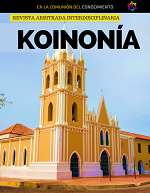Critical theory as an alternative for professional development in the Nursing discipline
DOI:
https://doi.org/10.35381/r.k.v6i11.1168Keywords:
Medical sciences, nursing, activity learning, practical work (learning method). (Words taken from the UNESCO Thesaurus).Abstract
The research aims to characterize critical theory as an alternative for professional development in the nursing discipline. Methodologically of bibliographic - documentary cut; where hermeneutics became the main source of information generation and with a non-experimental design. The corpus of the study was made up of readings related to nursing theories, contained in different texts, scientific articles and opinion articles available on the web. With the emergence of critical theories, the need was born to theoretically base the four disciplines of meta-paradigms, among these; human being, environment, health and nursing, each one under different approaches.
Downloads
References
Aguilar-Guzmán, O., Carrasco-González, M., García-Piña, M., Saldivar-Flores, A, & Ostiguín-Meléndez, R. (2007). Madeleine Leininger: un análisis de sus fundamentos teóricos [Madeleine Leininger: an analysis of its theoretical foundations]. Enfermería Universitaria, 4(2),26-30.
Ángel-Pérez, D. A. (2012). Hermeneutics and research methods of Social Science. Estudios De Filosofía, (44), 9-37.
Argote, L., Burbano, C., Santamaría, C., & Vásquez, M. (2011). El desarrollo disciplinar: Razón de ser, sentipensar y hacer en enfermería [Disciplinary development: Reason to be, feel and do infirmary]. Colombia Medica, 42(2), 78-85.
Carpenito, L. (2003). Manual de diagnósticos de enfermería [Nursing Diagnostics Manual]. Editorial Interamericana, 9a. ed.
Colliere, M. F. (2003). Promover la vida [Promoting life]. México: Interamericana McGraw-Hill.
De-Arco-Canoles, O., & Suarez-Calle, Z. (2018). Rol de los profesionales de enfermería en el sistema de salud colombiano [Role of nursing professionals in colombia's health system]. Universidad y Salud, 20(2), 171-182. https://doi.org/10.22267/rus.182002.121
Díaz-Barriga-Arceo, F. (2003). Cognición situada y estrategias para el aprendizaje significativo [Situated Cognition and Strategies for Meaningful Learning]. Revista electrónica de investigación educativa, 5(2), 1-13.
Flórez-Torres, I., Buitrago-Malaver, L. y Ramírez-Perdomo, C. (2017). El cuidado de enfermería: entre la dialéctica de la explicación y la comprensión.[ Nursing care: between the dialectic of explanation and understanding] Index Enferm, 26(4), 275-279
Gamboa, R. (2011). El papel de la teoría crítica en la investigación educativa y cualitativa.[ The role of critical theory in educational and qualitative research] Revista Electrónica Diálogos Educativos, (21), 48-64.
Minguez-Moreno I, & Siles J. (2014). Pensamiento crítico en enfermería: de la racionalidad técnica a la práctica reflexiva [Critical thinking in nursing: from technical rationality to thoughtful practice]. Aquichan, 14(4), 594-604.
Mora-Arellano, F. (2002). Por los rincones: Antología de métodos cualitativos en la investigación social [By the Corners: Anthology of Qualitative Methods in Social Research]. Región y sociedad, 14(23), 237-242.
Moreno, I. M., & Siles, J. (2015). Pensamiento crítico en enfermería: de la racionalidad técnica a la práctica reflexiva Critical thinking in nursing: from technical rationality to thoughtful practice]. Aquichan, 14(4).
Mosqueda-Díaz, A., Vílchez-Barboza, V., Valenzuela-Suazo, S., & Sanhueza-Alvarado, O. (2014). Critical theory and its contribution to the nursing discipline. Investigacion y educacion en enfermeria, 32(2), 356–363. https://doi.org/10.17533/udea.iee.v32n2a18
Osuna B, & González C. (2010). La enseñanza práctica de enfermería y el microscopio [Practical nursing teaching and microscope]. Rev Enferm Inst Mex Seguro Soc, 18(3):123-7.
Pérez-Pimentel, S. (2009). Enfermería transcultural como método para la gestión del cuidado en una comunidad urbana: Camaguey 2008 [Transcultural nursing like a method for care management in a urban community. Camaguey, 2008]. Revista Cubana de Enfermería, 25(3-4)
Prieto-Cano, V. (2013). Advocacy de la teoria a la practica un reto para enfermeria [Advocacy from theory to practice a challenge for infirmary] Universitat de les IIIes Balears. http://hdl.handle.net/11201/4059
Richards A, & Edwards S. (2010). Guía de supervivencia para enfermería hospitalaria [Survival guide for hospital nursing]. 2da ed. Barcelona: Elsevier.
Sánchez-Rodríguez, J., Aguayo-Cuevas, C., & Galdames-Cabrera, L. (2017). Desarrollo del conocimiento de enfermería, en busca del cuidado profesional. Relación con la teoría critica [Development of nursing knowledge, in search of professional care. Relationship with critical theory]. Revista Cubana De Enfermería, 33(3).
Tójar-Hurtado, J. (2006). Investigación cualitativa: comprender y actuar [Qualitative research: understanding and acting] Capítulo 3, p. 89-134. Editorial La Muralla, Madrid, España.
Urra, E, & Jana, A. (2010). Using an emancipatory paradigm for feminist postructuralist theory in nursing research: implications and challenges. Ciencia y enfermería, 16(3), 15-25. https://dx.doi.org/10.4067/S0717-95532010000300003
Villarreal, M. A. & Salazar, B., C. (2006). Teoría crítica y su contribución al desarrollo del conocimiento en la enfermería [Critical theory and its contribution to the development of knowledge in nursing]. Desarrollo Cientif Enferm, 14(9), 339-341.
Published
How to Cite
Issue
Section
License
CC BY-NC-SA : Esta licencia permite a los reutilizadores distribuir, remezclar, adaptar y construir sobre el material en cualquier medio o formato solo con fines no comerciales, y solo siempre y cuando se dé la atribución al creador. Si remezcla, adapta o construye sobre el material, debe licenciar el material modificado bajo términos idénticos.
OAI-PMH URL: https://fundacionkoinonia.com.ve/ojs/index.php/revistakoinonia/oai.









